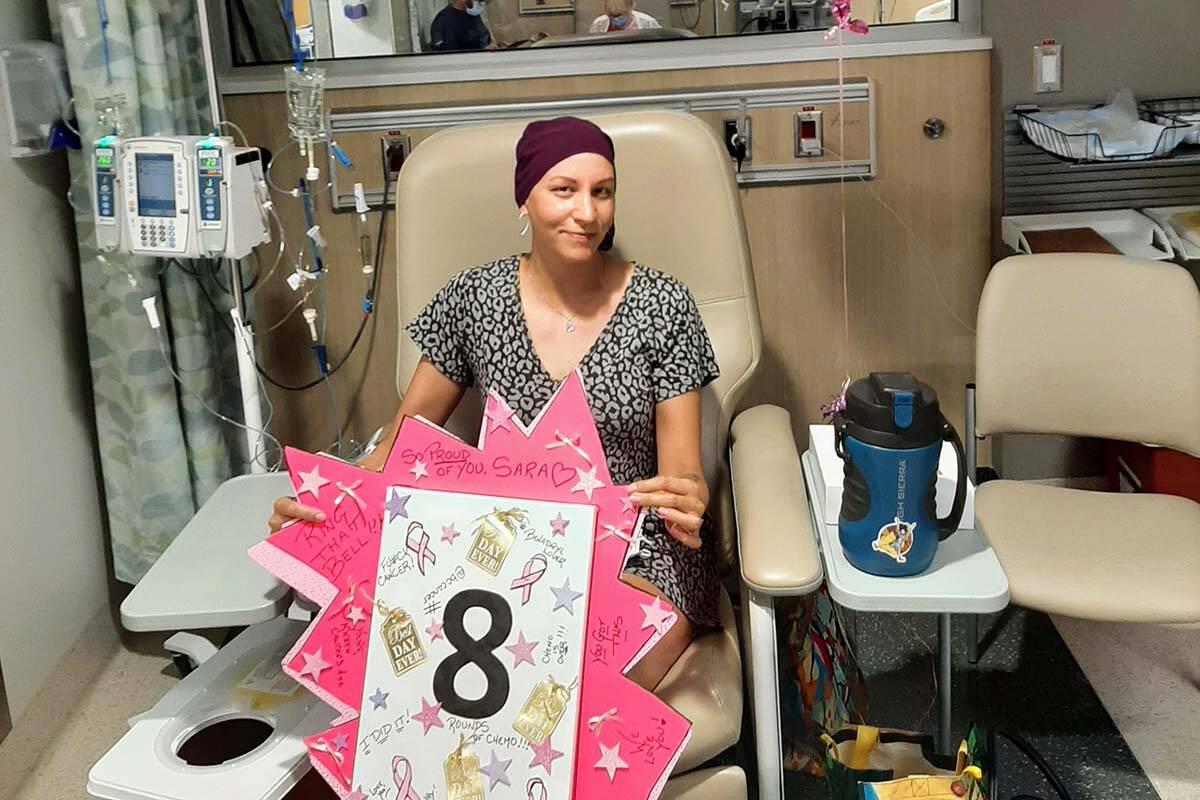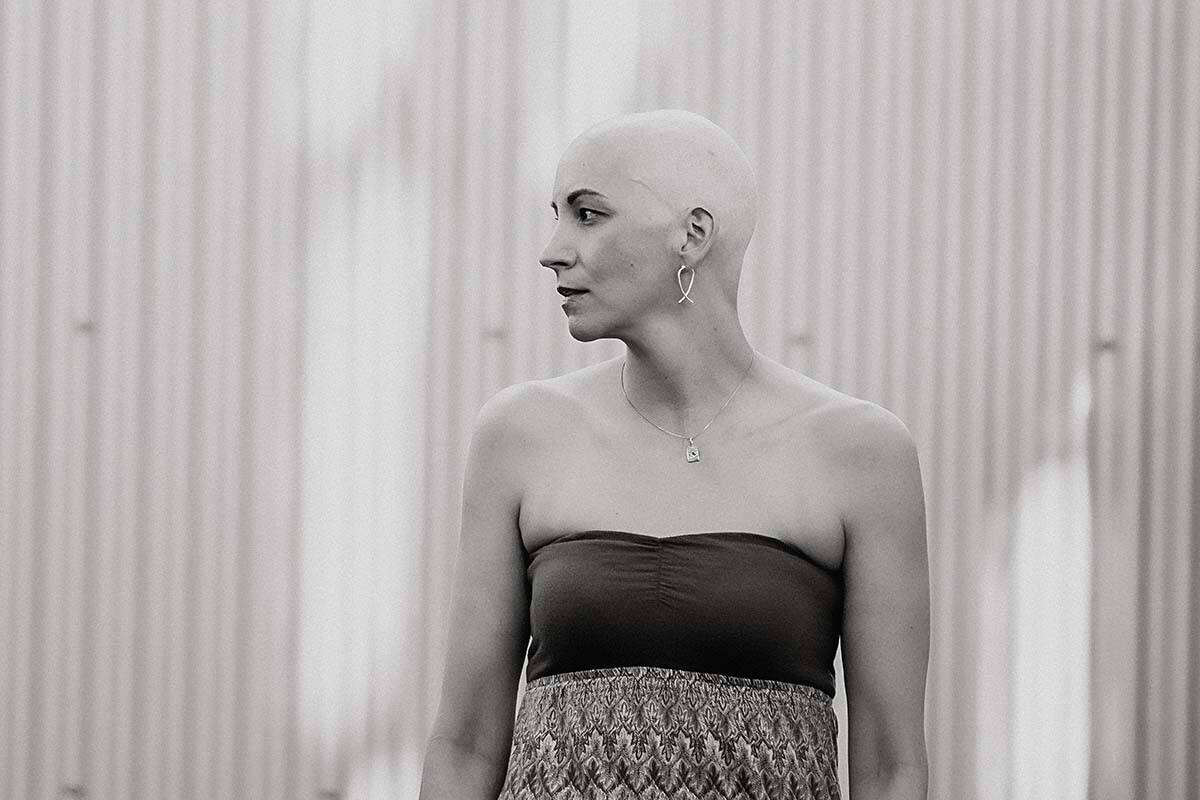Sara Johnston likely had breast cancer for two to three years before it was diagnosed.
She discovered it herself on a winter day in 2021. Just home from a trip to the gym, Johnston was undressing to get in the shower when she caught a glimpse of herself in the mirror and noticed something different: a dimple on the side of her right breast. Probing the area with her hand, she felt a large, hard lump.
Just 39 years old at the time, the Lower Mainland mother had never had a mammogram. In B.C., the breast cancer screening exam isn’t offered to women until they’re at least 40. Health Canada doesn’t recommend the test until age 50.
Johnston had also never been taught how to do a self-exam, but she knew something was wrong. Without a family physician, she waited at a walk-in clinic to have a doctor refer her for a mammogram. Another six weeks passed before she was able to be seen for an exam.
“It was a long and very, very stressful, very, very dark time for me.”
In April 2021, she was diagnosed with Stage 3 breast cancer. Had she waited until her 40th birthday to get a routine mammogram, Johnston said it’s likely it would have been Stage 4 – the most advanced form of cancer with only 32 per cent of patients living for five more years, according to the Canadian Cancer Society.
“The reality of that is quite frightening to think about.”
Now two-and-a-half years later, Johnston has been through eight rounds of chemotherapy, a double mastectomy and 25 rounds of radiation. She said she can’t help but wonder how things would have been different if mammograms were offered to younger women and if her cancer had been caught earlier on.
If it were up to her, screenings would begin as early as in a person’s 20s. Her push to see the age lowered comes amid a national conversation on the issue.
READ ALSO: B.C. woman who beat breast cancer twice advocates for body positivity on Instagram
Change to national guidelines under review
The Canadian Task Force on Preventative Health Care is set to update its breast cancer screening guidelines this fall and may change the recommended screening age from 50 to 40. The guidelines have long relied upon 50 as the starting age because that’s when the majority of breast cancer cases begin to occur.
According to the latest numbers from Statistics Canada, 86.2 per cent of the 26,175 women diagnosed with breast cancer in 2017 were aged 50 and older. The number of cases that occur in younger women is not insignificant, however. In that same year, 3,345 women aged 49 and younger were handed the same life-changing news.
Although less common, men can get breast cancer too. In 2017, 215 men were diagnosed with the disease across Canada.
In B.C., the number of younger women being diagnosed was enough to convince health officials that mammograms should be offered beginning at age 40. Even with that, dozens of women aged 39 and younger are told they have breast cancer in B.C. every year.
So why aren’t routine mammograms offered to all women regardless of age? Experts say it all comes down to a risk-benefit ratio.
Dr. Charlotte Yong-Hing, the medical director of breast screening at BC Cancer, said there are two main harms associated with screening in younger women.
First is the amount of radiation given off during a mammogram. This though, Yong-Hing said, is fairly minor given the radiation people encounter in their day-to-day lives. For instance, a person would be exposed to the same level of radiation during a round trip flight from Vancouver to Toronto as they would during a mammogram, Yong-Hing said. Still, radiation is known to be more harmful to younger people because their body tissues are still growing.
The second potential harm is the anxiety that screening can cause. A small percent of women who undergo a mammogram will be called back for further testing if the initial results aren’t clear, and Yong-Hing said having to wait to be sure of their outcome can be frightening. She added that further testing can be more common for younger women because their breast tissue tends to be denser, which makes screening more difficult.
Dr. Paula Gordon, a radiology professor at the University of British Columbia and breast cancer researcher, said the women she’s spoken with don’t always agree with the second risk, though.
“Women are horrified at how condescending and patronizing that is,” she said.
A third and highly uncommon risk is that women are treated for a cancer that wouldn’t ultimately have killed them.
For the health care system, testing younger women can also prove to be expensive. Studies show the price of a mammogram that catches breast cancer early on is far cheaper than treating things in an advanced stage, but if mammograms are simply giving people the all-clear, the costs can add up quickly.
Neither Gordon nor Yong-Hing said they think the screening age should be lowered below 40, but they said it’s important for younger women to discuss whether they may be at a higher risk of developing breast cancer with their primary care provider. Gordon said women should also be performing self-exams to get familiar with their breast texture, so they can tell if something changes. Doctors can order patients regular mammograms before they turn 40 if they agree there are concerns.
And while provinces have jurisdiction over health care, both Gordon and Yong-Hing said it would be an important move for Health Canada to lower the recommended screening age, as well. Having national guidelines that differ from provincial ones can cause confusion for family doctors and patients and dissuade women in their 40s from getting checked. As it is in B.C., Gordon said only about a quarter of women in their 40s get mammograms as recommended.
A September poll by Angus Reid and Breast Cancer Canada found 89 per cent of respondents believe the age should be dropped to 40 as well. A large majority also said Canada should be gathering race-based data on cancer screening rates.
For Johnston, screening at age 40 doesn’t go far enough. It wasn’t sufficient to catch her cancer and she knows it will inevitably delay diagnosis for others too.
She offers the same advice to women that a breast cancer patient gave her when she was first diagnosed: “Don’t take no for an answer and never let a doctor tell you that you are too young.”
READ ALSO: Revolutionizing breast cancer surgery: B.C. hospital adopts innovative technology


